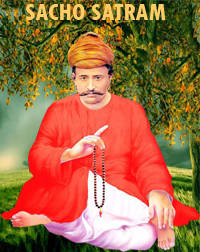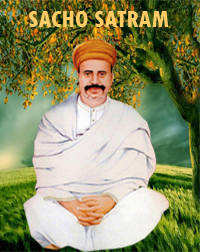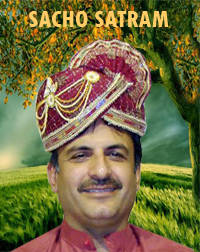In one of the divine Satsangs of Hazir Swaroop Sai Sadhram Saheb on an occasion of a wedding ceremony in the family of a devotee, Sai Sadhram Saheb emphasized that among the countless joyous moments in our lives, marriage stands out as one of the most exhilarating occasions.
Marriage symbolizes a sacred union between a man and a woman, serving as the fundamental keystone of human existence. When a marriage takes place, it signifies the creation of a home, the formation of a family, the establishment of various valuable relationships, and the enrichment of our society. These relationships are nurtured with respect, dignity, and adherence to social etiquettes, fostering harmonious coexistence.
Marriage is a tradition that involves many customs, and the structure of civilized humanity depends on the institution of legal marriage. It is through marriage that we come to fully appreciate and understand the significance and complexity of relationships. These connections include the bond between husband and wife, the relationship between father and son, the strong connection between father and daughter, the nurturing link between mother and daughter, the loving tie between mother and son, as well as the intricate web of relations among uncles, aunties, cousins, sisters-in-law, and brothers-in-law, along with the dynamics between father-in-laws and mother-in-laws.
All these relationships are deeply influenced by our intentions. It is essential for us to accept the appropriate conduct and level of respect required for each relationship, and act accordingly to nurture them. Healthy relationships are built upon values such as trust, respect, honesty, kindness, generosity, personal boundaries, and privacy. The responsibility of preserving these relationships by adhering to respected norms is significant and something that each of us must accept.
The institution of marriage is a strong foundation, without which humanity’s survival would be in question.
Saijan said that Marriages serve as the catalyst for the formation of relationships. After marriage, the arrival of children leads to the expansion of families, giving rise to extended family networks comprising uncles, aunties, cousins, mother-in-law, father-in-law, sisters-in-law, brothers-in-law, fathers, mothers, sisters, brothers, and more. Our intentions play a crucial role in shaping these relationships, influencing how we interact with our elders and younger family members. This includes the way we express love, show respect, exhibit formal or informal behavior, adhere to etiquette, and provide guidance and teachings to the younger generation.
All the family relationships thrive on the solid foundation of marriage, representing the entirety of humanity. The bond of marriage is unconquerable and unbreakable; it defies dissolution. Sometimes circumstances alter the dynamics of some relationships, even leading to separations from children, but the union between a husband and wife remains unshaken. The dissolution of a marital bond has far-reaching consequences, which is why in our culture, we can scarcely fathom the notion of married couples parting ways. In our languages, such as Hindi and Sanskrit, there is no term for divorce. We possess words like marriage and wedding, but there exists no linguistic representation for the concept of divorce in our cultural lexicon. The absence of such a term in our dictionaries reflects our cultural values and the emphasis on the sanctity of marriage.
In our culture, the very survival of humanity is intricately tied to the sacred institution of marriage. If this foundation were to crumble, all other relationships would be at risk of unraveling. Given its unyielding nature, the bond between a husband and wife demands careful nurturing, characterized by love and kindness. In the presence of this relationship, respect for elders, affection for children, and responsibility toward all other connections flourish.
The human existence stands apart from that of other species, marked by our civilization. Our choice to cover ourselves with garments is a testament to our respect for one another, representing civilized conduct. Humans are inherently destined to be civil, well-mannered, responsible, and respectful towards others and society. We are not meant to live unclothed or emulate animal-like behavior.
Additionally, humans possess the intellect to connect with Parmatma and explore the vast universe through their inner consciousness. This innate ability allows us to reach out to the eternal truth, by connecting with Parmatma.
Marriage is a unique institution found exclusively within human society, and its purpose extends to instructing and transmitting values of a civilized community. The relationships that evolve within this auspicious institution are founded on a bedrock of respect, defined boundaries, prescribed conduct, and a significant responsibility to one another. These attributes and qualities are passed on to our children, who bear the responsibility of constructing a robust and harmonious future for the generations to come.
Human beings hold a profound love for their children, surpassing any other affection, with high hopes for their children’s well-being. Human nature is inherently competitive; individuals often strive to surpass others. However, when it comes to their own children, victory is often bittersweet, as they lose peace if they emerge triumphant at the expense of their children’s happiness.
It’s evident that humans often experience feelings of jealousy and engage in competition across various fields, such as in the workplace, business ventures, games, or any other endeavor. There’s a natural inclination not to wish others to surpass our own children in success and happiness in any given field.
When our children make advancements in areas such as business, employment, or other pursuits, it brings us joy. Conversely, if they face challenges and don’t progress as we might have, we feel sorrow and consistently offer prayers for their success and growth.
It is our responsibility to nurture our children by imparting to them values, cultural awareness, intelligence, and various other qualities. Equally, it is our duty to honor and support our elders by extending to them the respect they deserve.
In our culture, during a wedding ceremony, both the bride and groom bow their heads slightly, and their foreheads gently touch each other.
Hazir Swaroop Sai Sadhram emphasises that, human beings most of the times exhibit certain shortcomings, such as a man displaying egoism and a woman showing a hint of stubbornness.
An individual may present a pleasant and affable attitude outside the home, but within the household, they may assert dominance by pressuring other family members to conform to their wishes. This behavior often stems from a sense of ego, driven by the awareness of being the provider for a dependent family.
Conversely, a woman may exhibit a strong-willed nature, determined to have her way and make others conform to her desires due to her stubbornness. Both these inclinations, found in both men and women, can disrupt the harmonious flow of married life.
The presence of stubbornness and ego within the home can create tension, complicating family life and disrupting the household’s atmosphere.
The symbolic act of the bride and groom lowering their heads during the wedding ceremony serves as an important reminder. It signifies the commitment to maintain their union by humbling their egos and minimizing stubbornness, all while upholding the sanctity of their family. This commitment includes demonstrating respect for their elders, fostering love, and transmitting invaluable values in their children.
Parents invest their hopes and expectations into raising their children, with the anticipation that their offspring will dutifully care for their elders, show respect, love and support to their family members, uphold proper behavior in society, grow into compassionate and responsible individuals, and bring glory to themselves. These parental aspirations and prayers are akin to heartfelt wishes, and when their children fulfill these hopes, they receive blessings not only from their elders but also from Parmatma.
Parents instill values in their children with the intention that these exceptional qualities will manifest in their behavior, earning them respect within society. Moreover, parents find joy in knowing that their children will not disappoint them.
It is a common experience that we feel a sense of pride when others commend our children, and conversely, we are saddened and disheartened if anyone criticizes them. The responsibility of raising our children and instilling valuable qualities within them is not solely for the benefit of our children but extends to the betterment of society and the universe as a whole.
In reality, children often don’t comprehend or absorb the lessons we try to teach them through explanations or lectures. Instead, they tend to model their behavior on our own actions and how we conduct ourselves. Children are keen observers, learning from our actions, social interactions, and family dynamics. They emulate what they see us do, adopt our speech patterns, and essentially become our mirrors.
If conflicts persist at home, marked by the use of inappropriate language, our children are likely to emulate this behavior, modeling their speech and conduct after what they have observed. Even if we attempt to caution them about the potential consequences of smoking on their lungs, alcohol on their liver, or using offensive language on their reputation, we often find that children tend to mimic the behaviors they have witnessed in their parents, either openly or discreetly.
Children tend to mirror their parents’ actions. This is precisely why, during wedding ceremonies, both the bride and groom are encouraged to lower their heads, as a symbolic reminder that in their married life, they should humbly set aside their egos to cultivate harmony, adapt to one another, and keep away from destructive conflicts and anger. The ultimate goal is to provide a peaceful atmosphere for their children to grow up in, learning from the positive example their parents have set.
Merely listening to the verbal wisdom of our elders and other esteemed individuals is not enough; we must actively apply their teachings in our lives.
If we observe attentively, we can recognize that we live in a time where knowledge abounds, and access to this wealth of information is readily available. The claim of being wiser than others often reveals the opposite, as today, proclaiming the ability to deceive someone only results in self-deception.
In the contemporary world, nobody is gullible. We possess an awareness of the happenings around us, understanding right from wrong. Sensibility is a common trait, and attempts at deceit often fall short, as we’re all brilliant enough to discern the truth. We frequently share advice with children, elders, friends, relatives, colleagues, and fellow members of society, believing in our own intelligence and sensibility.
Yet, it’s ironic that despite our well-intentioned advice, it’s rarely embraced; instead, people tend to dismiss the advice-giver, believing they fall short in their own conduct. This occurs because we’re often quick to advise others, yet fail to live in accordance with our own counsel. We scrutinize others but seldom introspect or seek self-improvement.
A human’s entire life unfolds as a reflection of what they observe from others. From the moment of birth, humans watch and learn, absorbing knowledge from those around them. This continues throughout school, college, work, and business. Most of our actions are imitations, with 80% of our life comprising what we mimic from others, and only 20% being truly original.
We instruct our children to respect their elders, but it is our own example that leaves a lasting impression. Our conduct, our etiquette, and our benevolence shape our children’s behavior. Just as our elders pass down property and jewelry, they also bestow upon us their goodwill, for we follow their lead by observing them.
Therefore, it’s essential to remember that we pass on not only our material possessions but also our goodwill to our children. Our goodwill becomes their most valuable asset, accompanying them throughout their lives as a moral inheritance and legacy.
The way we interact with others is often mirrored by our children in their interactions with us. Therefore, it’s crucial that we uphold good conduct in our own lives, as the behavior we model will be returned to us by our children. To truly understand and appreciate the value of what we learn, it is essential that we put that wisdom into practice. Mere listening without application may lead others to comment that we offer good advice but fail to implement it in our own lives.
It is our responsibility to heed the teachings of our elders and revered mentors, elevating ourselves as humans and aspiring to be extraordinary, rather than regressing into negative behaviors. Human beings must strive for greatness by diligently practicing the wisdom imparted by these remarkable individuals.
Marriage, too, is a sacred bond that a man and a woman must strengthen and beautify, not just through verbal acknowledgment of its sanctity and significance, but by living out the values of a holy marriage in their everyday lives. In doing so, they pass on this wisdom to their future generations, allowing them to sustain and preserve humanity.
This is why the bride and groom are encouraged to bow their heads slightly during the wedding ceremony as a reminder to humbly live together, striving to build a beautiful future for themselves and their children.
During a wedding ceremony, the pandit imparts wisdom to the couple on living harmoniously and humbly together. The bride and groom perform pheras around the sacred wedding fire. At a pivotal moment, the pandit stands and places his hands on the heads of the bride and groom, reminding them to diminish their egos and unite their lives.
As the entire humanity relies on the sanctity of the marital bond, it becomes the collective responsibility of all to recognize the sacredness of marriage. Honesty and accountability are paramount in this relationship, with mutual understanding forming the foundation when a man and a woman decide to marry.
Marriage serves as the strong foundation for all other relationships, hinging on understanding, respect, humility, and the preservation of humanity. Children born within wedlock, referred to as legitimate, carry with them the beauty of comprehending relationships, valuing respect for others, and embracing humility. They are nurtured in an environment that imparts the significance of social values.
Weddings play a vital role in society, fortifying family relationships and establishing the rightful recognition and respect for marriage throughout the human world.
Our ancestors had the foresight of how humanity can endure, which is why they discouraged divorce and emphasised that once a man and woman become husband and wife after marriage, they cannot be separated. Separation between husband and wife is forbidden in our Dharma, as it was believed that if this bond were to break, civilisation itself would crumble, leading to the downfall of humanity.
Hence, our dictionaries lack the word ‘divorce,’ replacing it with ‘Bandhan’. We firmly believe in the concept of a lifelong union between husband and wife, spanning seven births or every lifetime.
Our ancestors held the conviction that focusing our energy on self-improvement rather than on advising and judging others would contribute to our own betterment and everlasting happiness. By utilising just 20% of our energy for our personal growth out of 100%, we can conserve the remaining 80% and contribute to our ongoing happiness and the overall peace of the world.
Hazir Swaroop Sai Sadhram Saheb highlighted that applying the teachings of Shahanshah Satguru Sai Satramdas Saheb and Sant Kanwarram Saheb in our lives can propel us to great heights, both in this life and in the hereafter.



